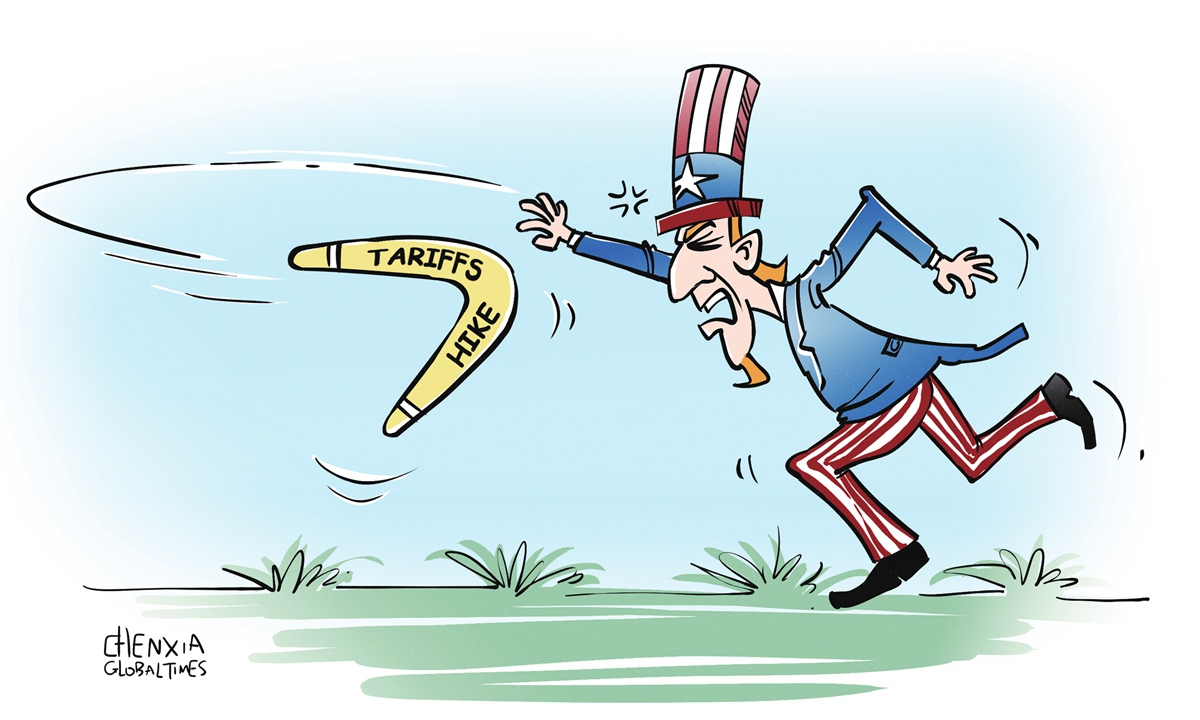
Illustration: Chen Xia/GT
At a time when the global trade system is
mkfacing another round of tariff barrier challenges, the urgency for China and the US to seek new opportunities for cooperation, rather than falling into a tariff war that sees no winner, is becoming increasingly prominent.
US consumer goods giant Procter & Gamble (P&G) will look to hike prices on its household basics if US President Donald Trump imposes new tariffs that increase the cost of imports, P&G's chief financial officer said on Wednesday, according to a Reuters report. The company usually buys inputs like chemicals, razor blades and small electronics from around the world and manufactures the final product closer to consumers in local factories.
P&G's situation to a certain extent reflects the concerns that American companies have regarding the challenges of cost surges posed by Trump's proposed round of new tariffs.
Trump on Tuesday voiced his latest threats for a new February 1 deadline for 25 percent tariffs against Canada and Mexico, as well as duties on products from China and the EU, according to Reuters.
In response to a question regarding reported Trump's tariff plan, Chinese Foreign Ministry spokesperson Mao Ning said on Wednesday that "We believe that there's no winner in a trade or tariff war, and we firmly uphold our national interests."
Over the years, the tariff policies adopted by the US have proven to be an unsustainable option. Continuing to raise tariffs will not only harm the interests of businesses but will also risk escalation into a global tariff war, potentially inflicting significant damage on the global economy.
What China and the US truly need is a collaborative effort to alleviate the uncertainties that companies from both nations face regarding trade and investment and strengthen supply chain cooperation. It is essential to emphasize that cooperation between China and the US must be grounded in the principles of equality, mutual benefit and win-win outcomes. Neither side can effectively resolve differences and issues through threats or by forcing the other side to make concessions.
In recent months, the looming threat of potential tariffs has sparked widespread concerns across the globe. The potential new tariffs will not only trigger a chain reaction in the US commercial sector but will also send ripples throughout the global supply chain. From raw material suppliers to consumers, everyone could feel the chill of dramatic changes in the global trade environment in the near future.
Nevertheless, a notable trend is that many US importers have rushed in goods from China in response to the potential tariff barriers, aiming to lock in supply chain costs before any release of new tariff policies. For instance, US sunscreen maker Edgewell said in November 2024 that it was looking to reach new two- to three-year contracts for Chinese chemicals to help control costs ahead of possible tariffs.
This indicates that despite the US attempt to reshape the global trade landscape through tariff policies, companies' reliance on global supply chains, particularly on Chinese supply chains, remains a key factor in maintaining their market competitiveness. Behind this phenomenon is the recognition of the stability and efficiency of the Chinese supply chain by American businesses, thanks to the former's comprehensive industrial system and strong manufacturing capabilities.
The potential consequences of the US tariff policies on major trading partners are already evident. The imposition of tariffs will directly lead to increased import costs for American businesses, which will ultimately pass these costs on to American consumers, contributing to inflation. Furthermore, the additional tariffs will cause disruption to established supply chains, increasing operational costs for businesses.
More importantly, the unilateral imposition of tariffs by the US undermines the foundation of international cooperation, further squeezing the space for collaboration, particularly China-US economic and trade cooperation. As one of the most important bilateral economic and trade relationships in the world, China-US trade holds significant importance for the stability and prosperity of both countries and the global economy. Tariffs will only exacerbate divisions, which will be detrimental to the development of China-US economic and trade cooperation and bring great uncertainty to the global economic recovery.
Thus, it is increasingly urgent for China and the US to explore and expand avenues of cooperation that can enhance stability and certainty in their bilateral economic and trade relations. This approach aligns with the fundamental interests of both peoples and is vital for maintaining the stability and prosperity of the global economy.

